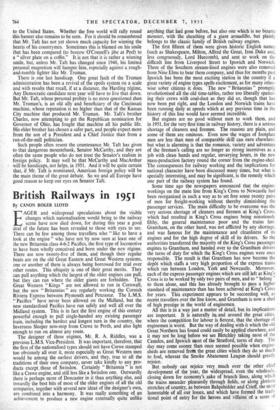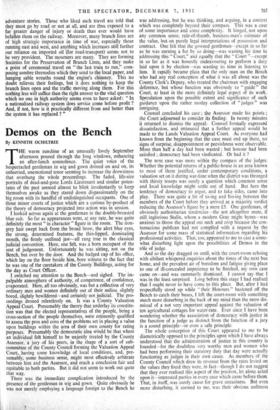British Railways in 1951
By CANON ROGER LLOYD F4 AGER and widespread speculations about the visible changes which nationalisation would bring to the railway scene have now died down, for during this year a good deal of the future has been revealed to those with eyes to see. There can be few among those travellers who "like to have a look at the engine" who have not by now seen at least one of the new Britannia class 4-61-2 Pacifies, the first type of locomotive to have been wholly conceived and born under the new regime. There are now twenty-five of them, and though their regular beats are on the old Great Eastern and Great Western systems, one or another of them is always being borrowed-for trial over other routes. This ubiquity is one of their great merits. They can pull anything which the largest of the older engines can pull, but they can run where the older giants are forbidden. The Great Western " Kings " are not allowed to run in Cornwall, but the new " Britannias " are regularly working the Cornish Riviera Express between Plymouth and Penzance. The L.M.S. " Pacifies " have never been allowed on the Midland, but the new standardised Pacifies have run safely and well all over the Midland system. This is in fact the first engine of this century powerful enough to pull single-handed any existing passenger train, including the hardest and longest turn in the country, the Inverness Sleeper non-stop from Crewe to Perth, and also light enough to run on almost any route. The designer of these engines, Mr. R. A. Riddles, was a previous L.M.S. ViceRresident. It was important, therefore, that the first of the nationalised types should not have Crewe stamped too obviously all over it, more especially as Great Western men would be among the earliest drivers, and they, true to all the traditions of their own company, never take kindly to any pro- ducts except. those of Swindon. Certainly "Britannia " is not like a Crewe engine, and still less like a Swindon one. Outwardly there is perhaps more of Doncaster in it than anything else, and inwardly the best bits of most of the older engines of all the old companies, together with several new idea § of the designer's own, are combined into a harmony. It was really something of an achievement to produce a new engine externally quite unlike anything that had gone before, but also one -which is no bizarre monster, with the sheathing of a giant armadillo, but plainly belongs to the classic family of British railway engines. The first fifteen of them were given historic English names (such as Shakespeare, Milton, Alfred the Great, Iron Duke and, less congruously, Lord Hurcomb), and sent to work on the difficult line from Liverpool Street to Ipswich and Norwich. Three of the Southern stream-lined engines were also removed from Nine Elms to bear them company, and thus for months past Ipswich has been the most exciting station in the country if a great variety of engine types spells excitement, as for many other- wise sober citizens it does. The new " Britannias " promptly revolutionised all the old time-tables, rather too liberally spatter- ing their crews with coal-dust as they did so, though that has now been put right, and the London and Norwich trains have been running daily at speeds which at any previous time in the history of this line would have seemed incredible.
But engines are no good without men to work them, and in 1951, for the very first time in railway history, there is a serious shortage of cleaners and firemen. The reasons are plain, and some of Ahem are ominous. Even now the wages of footplate men are less than men of comparable skill can earn elsewhere.
but what is alarming is that the romance, variety and adventure of the fireman's calling are no longer as strong incentives as a job with clean hands and regular, unvarying hours, in the new mass-production factory round the corner from the engine-shed. The consequences for railway working and the implications for national character have been discussed many times, but what is specially interesting, and may be significant, is the remedy which one part of the railway system has found.
Some time ago the newspapers announced that the engine- workings on the main line from King's Cross to Newcastle had been reorganised in such a way as to set free some twenty pairs of men for freight-working without thereby diminishing the passenger services. The main difficulty to be overcome was the very serious shortage of cleaners and firemen at King's Cross, which had resulted in King's Cross engines being notoriously filthy, the general maintenance poor and the trains late.
Grantham, on the other hand, was not afflicted by any shortage, and was famous for the maintenance and cleanliness of its engines and for the high degree of skill of its drivers. So the authorities transferred the majority of the King's Cross passenger engines to Grantham, and handed over to the Grantham drivers the turns of duty for which the King's Cross_ engines were once responsible. The result is that Grantham has now become the depot which staffs a very high proportion of the express trains which -run between London, York and Newcastle. Moreover, each of the express passenger engines which are still left at King's Cross is to be worked by only two pairs of men, and to " belong " to them alone, and this has already brought to pass a higher standard of maintenance than has been achieved at King's Cross for years. This experiment appears to be succeeding well, as recent travellers over the film know, and Grantham is now a shed of high prestige in the world of enginemen. All this is in a way just a matter of detail, but its implications are important. It is naturally in, and around the great cities, where the competition for labour is fiercest, that the shortage of enginemen is worst. But the way of dealing with it which the old Great Northern has found could easily be applied- elsewhere, and it may not be long before we see Bletchley taking most of the Camden, and Ipswich most of the Stratford, turns of duty. The day may come sooner than once seemed possible when engine- sheds are removed from the great cities which they do so much to foul, whereat the Smoke Abatement League should greatly rejoice. But nobody can rejoice very much over the other chief development of the year, the widespread, even the wholesale, closing down for economy's .sake of branch lines, along which the trains meander pleasantly through fields, or along glorious stretches of country, as between Balquhidder and Crieff, the most lamentable of all our losses, and which have formed the tradi- tional point of entry for the heroes and 'villains of a score of adventure stories. Those who liked such travel are told that they must go by road or not at all, and are thus exposed to a far greater danger of injury or death than ever would have befallen them on the railway. Moreover, many branch lines are of high strategic importance in time of war, especially those running east and west, and anything which increases still further our reliance on imported oil (for road-transport) seems not to be very provident. The mourners are many. They are forming Societies for the Preservation of Branch Lines, and they make a point of ceremonial travel on "the last train to run,' com- posing sombre threnodies which they send to the local paper, and hanging sable wreaths round the engine's chimney. This no doubt relieves their feelings, but it does nothing to keep the branch lines open and the traffic moving along them. For this nothing less will suffice than the right answer to the vital question which no one in high authority seems even to have asked: "In a nationalised railway system does service come before profit ? And, if not, how is it practically different from and better than the system it has replaced?"



















































 Previous page
Previous page